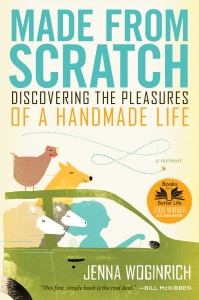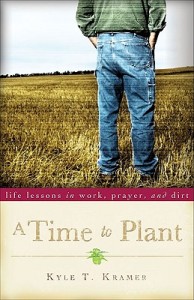A Gardener’s Reading, 17-20 of 30
In this season of choir concerts and holiday musicales, I’ve been thinking about the many voices that sing of the importance of gardening – not just as a way to create beauty or grow food, but as an essential source of meaning in our lives. People are creative — they want to make things, they want to feel connected to the earth and those around them, and as technology takes over so many tasks, gardening is one way people can make, create and celebrate their humanity.
In the past year, I’ve read four books that speak to meaning and gardening. The authors of these garden memoirs have disparate voices; they emphasize different aspects of caring for land, plants and animals, but the tune is similar: Peace and love can grow a home garden.
 Made from Scratch: Discovering the Pleasures of a Handmade Life, by Jenna Woginrich (Storey Books, 2009) tells the story of Woginrich’s transformation from college student to self-reliant homesteader. As a young graduate working in northern Idaho, Woginrich decides to tread lighter on the land and be more self-reliant. In pursuit of that goal, she learns how to garden, bake bread, keep chickens, bees, and rabbits, sew, knit, and reuse and recycle whatever she can. (She’s a big fan of coffee percolators.) The book is an homage to doing daily tasks yourself.
Made from Scratch: Discovering the Pleasures of a Handmade Life, by Jenna Woginrich (Storey Books, 2009) tells the story of Woginrich’s transformation from college student to self-reliant homesteader. As a young graduate working in northern Idaho, Woginrich decides to tread lighter on the land and be more self-reliant. In pursuit of that goal, she learns how to garden, bake bread, keep chickens, bees, and rabbits, sew, knit, and reuse and recycle whatever she can. (She’s a big fan of coffee percolators.) The book is an homage to doing daily tasks yourself.
Woginrich never hides her enthusiasm or her ignorance, and she addresses — sometimes eloquently — the consequences of her mistakes. An experiment in beekeeping, for example, ends in disaster for the bees twice. Throughout her journey, Woginrich seeks advice from more experienced hobbyists, and along the way gains friends who give both Woginrich — and her readers — information on how to live more self-reliantly.
Since the publication of Made from Scratch, Woginrich moved to a farm in New York state where she cares for chickens, sheep and other animals and has written three other books about homesteading.
 Time to Plant: Life Lessons in Work, Prayer and Dirt, by Kyle T. Kramer (Sorin Press, 2011) is another coming of age on the land story but it is also a powerful spiritual memoir. In his mid-20s, Kramer is a theology graduate student living in Atlanta, working at a private school and volunteering at nearby church. As fulfilling as he finds his work and study, he feels called to a life closer to his roots in southern Indiana and closer to the earth.
Time to Plant: Life Lessons in Work, Prayer and Dirt, by Kyle T. Kramer (Sorin Press, 2011) is another coming of age on the land story but it is also a powerful spiritual memoir. In his mid-20s, Kramer is a theology graduate student living in Atlanta, working at a private school and volunteering at nearby church. As fulfilling as he finds his work and study, he feels called to a life closer to his roots in southern Indiana and closer to the earth.
He eventually buys 20-acres of land that needs care desperately. He builds a primitive shelter – at first a pole-barn apartment with outdoor toilet facilities. He plants gardens and learns from his family and neighbors how to grow food better. He falls in love, and he and his wife build a house and then have twins. Along the way, he is supported by the Benedictine monks at St. Meinrad’s Abbey, who give him a job (Kramer still works as director of education there), shelter during his first cold winter on the farm, advice, and more important than all of that, an example of lives filled with physical work, prayer, community and love.
While Woginrich is upbeat, even in her trials, Kramer sinks deep at points in this memoir – he despairs his tendency toward overwork and perfectionism, his lack of knowledge, his pride; he suffers depression – but he is held up throughout by his family, his neighbors, his faith community and his faith itself. The book is not a downer, though. Parts of it are very funny, all of it well-written, and ultimately Kramer’s story is testament to ways the divine works through the land and community to reshape a heart.
 Radical Homemakers: Reclaiming Domesticity from a Consumer Culture, by Shannon Hayes (Left to Right Press, 2010), views gardening in a political and economic context more than a religious one. Hayes, who lives on a beef farm with her husband and children, is the author of two meat cookbooks, but in this manifesto she sears a culture that encourages people to work too much, to buy too much and along the way, to disdain all things domestic and nurturing.
Radical Homemakers: Reclaiming Domesticity from a Consumer Culture, by Shannon Hayes (Left to Right Press, 2010), views gardening in a political and economic context more than a religious one. Hayes, who lives on a beef farm with her husband and children, is the author of two meat cookbooks, but in this manifesto she sears a culture that encourages people to work too much, to buy too much and along the way, to disdain all things domestic and nurturing.
The book began when Hayes gave a talk about local and sustainable beef at a conference of dieticians. Local and sustainable food is possible for all Americans, she said, but an increasing number of people do not have the skills to cook (let alone grow or raise) their food. We need to bring back the home-maker, Hayes told the crowd of professional women, who – to her surprise – burst into applause.
In Radical Homemakers, Hayes examines the political and economic forces that promote consumption over creation, that drive people from home life toward a corporate and work-centered existence – what Hayes calls the “extractive economy” – and contrasts it with a more interdependent, family-centered approach. Having a job (or two), Hayes argues, gives an illusion of security but, as she said in an interview, “one angry boss and the income stream was gone.” Being able to manage on your own – growing food, being able to do home repairs, bartering with neighbors for goods and services – may afford more security, and it’s often more satisfying.
In the second half of the book, Hayes profiles 20 households that are “radical homemakers,” people who grow food, barter, have carpentry skills, and are not married to their work. Radical Homemaking is a manifesto, urging people to reclaim their homes (and gardens) and the domestic sphere as valuable.
 Grow the Good Life: Why A Vegetable Garden Will Make You Happy, Healthy, Wealthy and Wise by Michelle Owens (Rodale Press, 2011) is in some ways a book in a different class from the three other garden memoirs reviewed here. Owens is a co-founder of the popular blog Garden Rant, a writer for O magazine, and for years, her vegetable garden was at her second home in upstate New York. My guess is, she has indoor plumbing.
Grow the Good Life: Why A Vegetable Garden Will Make You Happy, Healthy, Wealthy and Wise by Michelle Owens (Rodale Press, 2011) is in some ways a book in a different class from the three other garden memoirs reviewed here. Owens is a co-founder of the popular blog Garden Rant, a writer for O magazine, and for years, her vegetable garden was at her second home in upstate New York. My guess is, she has indoor plumbing.
And, that’s fine –most of us don’t want to tough it out just to eat fresh vegetables, and Owens’ argument is that gardening can “seamlessly fit into the normal insanity of modern life.” She sees the reluctance of Americans to grow vegetables not as a corporate conspiracy, a la Hayes, but a marketing problem. Gardening is made to look harder than it really is, she notes correctly, and most households could and should have a garden.
For the bulk of the book, Owens combines personal stories with data to explain why growing a vegetable garden saves money, improves health, adds to the beauty of your landscape, is good for the earth and children, and will make gardeners themselves happier. I can’t argue with anything Owens says (unlike each of the earlier writers) and maybe that’s why this book struck me as a bit blah. It’s a nice looking book and a relatively quick read – the kind of book to pass on to someone who needs just a little encouragement to jump into gardening.
The first three of these, especially, sound really interesting, and even though I’m not a rank beginner I could use some encouragement along the lines of the fourth. Thanks for the reviews!